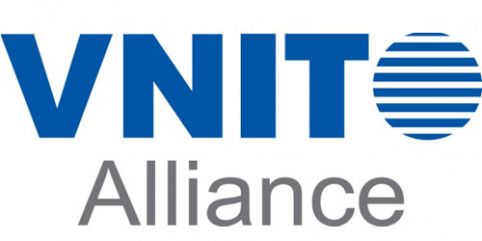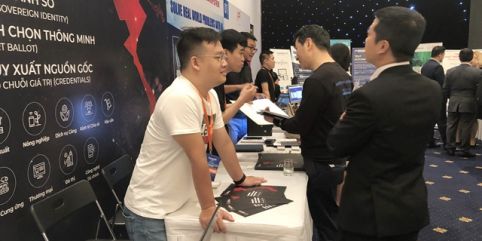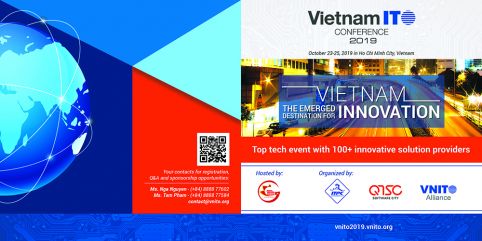|
According to the Vietnam Information Technology Outsourcing Alliance (VNITO), 2016 notched up a successful year for the local software industry whose total revenue amounted to around US$1 billion last year. Coming with such a robust growth are also urgencies of qualified human resources training. |
|
|
At the press briefing on the upcoming Vietnam Information Technology Outsourcing Conference 2017 (VNITO 2017), VNITO Chairman Lam Nguyen Hai Long said preliminary statistics show that last year’s revenue from software and information technology (IT) outsourcing of Vietnam might have reached US$1 billion. Opportunities and challenges Nguyen Huu Le, board chairman of TMA Solutions, said an engineer worki1ng in the software outsourcing or IT services in Vietnam can generate products worth US$20,000 (approximately VND450 million). Therefore, a software outsourcing company staffed by 1,000 engineers may earn annual sales of some US$20 million. At present, Vietnam’s IT outsourcing is facing both opportunities and challenges. On the one hand, Vietnam has been assessed by many international research organizations as a suitable destination in the global IT outsourcing map. On the other, the fourth-generation technological revolution has spurred the demand for IT human resources in both quantity and quality. Challenges, however, are that IT businesses must increase production capacity to meet growing customer expectations as a way to sustain the development of the IT outsourcing industry in the long term. According to representatives of IT outsourcing firms, English-speaking markets—including many European countries, the U.S. and Australia—are Vietnam’s biggest and the most fastidious markets. Vietnam is now facing harsh competition from India and China in this industry, though. A decade ago, Vietnam’s outsourcing enterprises relied on low costs to attract orders. Japanese IT companies often chose Vietnam as their software outsourcing partner mainly for this reason. Times have changed. Most Japanese key tech firms have now agreed to pay higher prices for their outsourcing partners in Vietnam which the former deem to be able to implement more complicated contracts. Viet Ho, chief procurement officer and managing director of Russell Investments, said Vietnam was once cited as a venue where IT personnel’s salaries were relatively cheap. In the future, however, that advantage may no longer be distinct as Vietnam is likely to encounter harsh competition from other countries. For instance, IT labor costs in HCMC are lower than those of India’s “first-class” cities, but they are higher than those of “second-class” or “third-class” localities. India can transfer outsourcing jobs to localities having lower labor costs to lure more contracts and will thus intensify competition against Vietnam. Viet Ho added that the global software export is estimated to be over US$200 billion, of which Vietnam accounts for merely US$200-300 million, or 0.1%. As a result, Vietnam’s potential for software outsourcing development in particular and IT in general remains remarkable. Insufficient human resources Nguyen Huu Le of TMA Solutions said large number of orders during peak seasons have forced many firms, including his, to turn down some orders, leaving such chances to other foreign rivals. In fact, human resources for the IT industry in general and software outsourcing in particular have failed to fully exploit all opportunities. The shortage of quality personnel has produced fluctuations on the labor market, which has resulted in prohibitively expensive IT labor costs. Exorbitantly high salaries for software engineers and programmers are now a headache to businesses in the sector when it comes to recruitment for carrying out their new orders. Formerly, it wasn’t a tough job for an IT company to hire a staff of 100 employees within a month. However, such a task is almost impossible for many. Skilled, experienced employees have become rarer, and job hopping has made the labor market unstable. VietnamWorks.com, an online recruitment website, said the monthly salary for applicants who are fresh graduates or have two-year working experience is US$600-800. According to many technical experts, such a wage is fairly high compared with the salary policy of most local IT companies. Nguyen Quoc Hung, board chairman of Logigear, said the U.S. and North American markets have requested higher expertise, productivity and experience from software outsourcing engineers over the past two years. Therefore, domestic software outsourcing companies should invest more in research and development (R&D) and training of young engineers to improve their skills and foreign language commands. Furthermore, IT outsourcing firms should also intensify their sales promotion and market development activities. More trade and cooperation opportunities will help companies secure their markets and attract new customers. VNITO Chairman Lam Nguyen Hai Long, a representative of the organizing board of VNITO 2017, said this year’s event aims to promote Vietnam as a leading destination of IT services. Earlier, VNITO members conducted market surveys and trade promotion sessions with foreign trade agencies to forge trade partnership and expand markets for domestic IT outsourcing enterprises.
Source: By Chi Thinh - The Saigon Times Online |





 Tiếng Việt
Tiếng Việt









